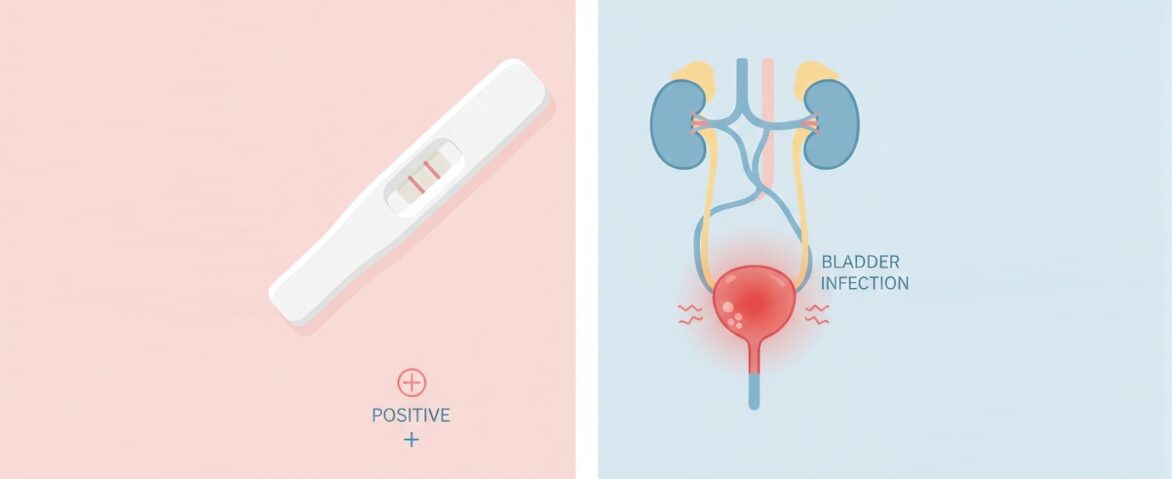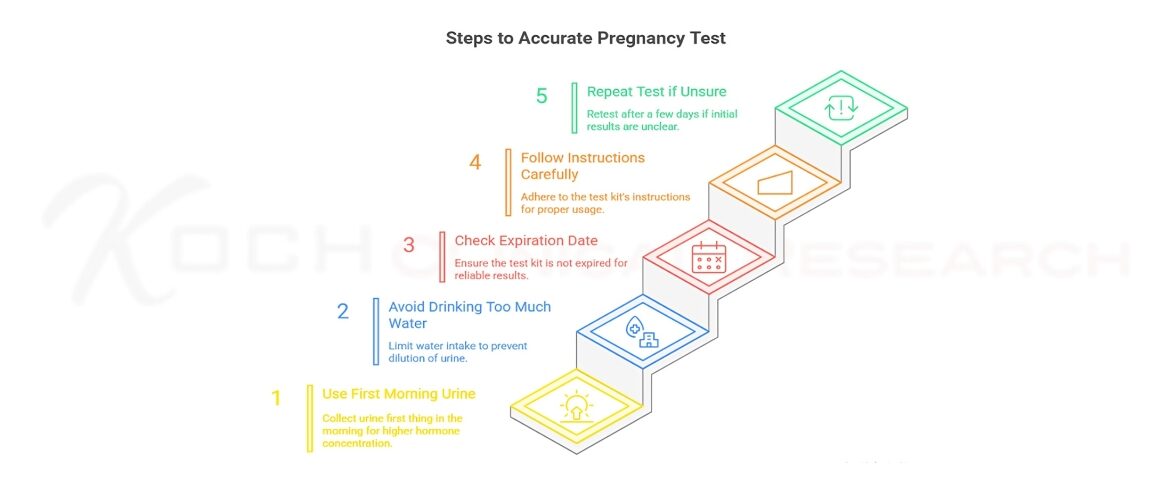
Key Takeaways:
- Pregnancy tests work by detecting a hormone called hCG, which is released after implantation.
- Urinary Tract Infections (UTIs) do not produce hCG, so they cannot directly cause a false positive pregnancy test.
- UTIs can affect the accuracy of a test, making results harder to interpret.
- Always follow Simple testing tips to improve accuracy.
Pregnancy tests work by detecting a hormone called hCG, while UTIs affect your urinary system. Since both situations involve changes in the body, it’s easy to get confused. The overlapping symptoms, like frequent urination and pelvic pain, only add to the worry.
In this blog, we will clear up the doubts. You’ll learn how UTIs and pregnancy tests work, whether infections can change results, why false positives and false negatives occur, and what you can do to get the most accurate answer.
Understanding UTIs and Pregnancy Tests
What is a UTI?
A urinary tract infection occurs when bacteria enter and grow in your bladder or urethra. Symptoms include burning when urinating, constant urgency, lower abdominal pain, or cloudy urine. While uncomfortable, UTIs are common and usually treatable with antibiotics.
The problem is that some of these symptoms overlap with early pregnancy. For instance, frequent urination and pelvic pressure can happen in both conditions. This overlap is what often leads to the question: Can a UTI cause a false positive pregnancy test or make the test harder to trust?
How Do Pregnancy Tests Work?
Pregnancy tests measure human chorionic gonadotropin (hCG), a hormone produced only after a fertilized egg implants in the uterus. Urine tests are most common and widely available, while blood tests are performed in clinics for greater accuracy.
- Urine tests detect hCG quickly but may give misleading results if not used correctly or if the urine sample is contaminated.
- Blood tests measure much smaller amounts of hCG and confirm results with high accuracy.
Since UTIs do not produce hCG, the infection itself cannot cause a test to be positive. Still, factors linked to UTIs can sometimes complicate results, which is why the connection deserves a closer look.
Can a UTI Cause a False Positive Pregnancy Test?
This is the main concern for many women. To answer directly: a UTI does not produce hCG, so it cannot directly cause a false positive result. However, confusion can still happen under certain circumstances.
If your urine contains blood, pus, or excess protein due to infection, the test strip may be harder to read. This may look like a faint line and lead you to believe you’re pregnant when you’re not. That’s why some women feel uncertain and wonder, can a UTI cause a false positive pregnancy test, even though the infection isn’t changing hormone levels.
Other possible reasons for false positives include:
- Using an expired or faulty test kit
- Misreading faint evaporation lines as a positive result
- Taking fertility drugs that contain hCG
Furthermore, antibiotics given for UTIs do not trigger positive results. A UTI itself is not the cause. However, the situation around it, such as contaminated urine or test misinterpretation, may create the illusion of a false positive pregnancy.
Can a UTI Affect a Pregnancy Test?
Another common question that comes up when women face the situation is: Can a UTI affect a pregnancy test in any way? The answer is yes, but not in the way many assume.
A UTI may make urine cloudy, discolored, or change its smell, which can blur or alter the way test lines appear. This doesn’t mean the hormone reading is wrong; it only affects how easy it is for you to interpret. Moreover, when you are already uncomfortable from infection, stress and anxiety can make you doubt the results.
So, while the infection doesn’t interfere with hCG detection, it can still affect how confident you feel about the results. Additionally, if you are unsure, take another test after your UTI is treated, or ask your doctor for a blood test for a more accurate answer.
UTI and Negative Pregnancy Test
Now let’s look at the other side. Many women ask, can a UTI cause a negative pregnancy test? The truth is that the infection itself does not interfere with hCG production or detection. However, the circumstances surrounding a UTI can make false negatives more likely.
Here’s why this happens:
- Diluted urine: When you drink extra water to ease the burning sensation, the urine becomes diluted. This lowers the concentration of hCG, making it harder for the test to detect.
- Testing too early: If you take a test before your body produces enough hCG, the strip may not detect it.
- Incorrect usage: Not following instructions or checking results too late can easily cause mistakes.
So, can a UTI cause a negative pregnancy test? The simple answer is no. UTIs don’t block hCG, but they can create conditions that make accurate detection harder.
Key Differences Between False Positive and False Negative Results
Understanding the difference is important, especially if you’re dealing with a UTI and uncertain test results.
| Result Type | What It Means | Common Causes (with UTI context) |
|---|---|---|
| False Positive | The test indicates you are pregnant, but in reality, you are not. | - Testing mistakes (expired kit, misreading faint line) - Rare medication side effects (fertility drugs with hCG) |
| False Negative | The test shows you are not pregnant, but you actually are. | - Diluted urine from drinking too much water during UTI discomfort - Testing too early - Incorrect test usage |
What to do next?
If you face a suspected false positive, confirm with a clinic blood test. Moreover, review kit dates and timing.
If you suspect a false negative, repeat in two or three days using the first morning urine. Moreover, avoid extra fluids before testing.
How to Get Accurate Results
When testing at home, a few simple steps can help you avoid confusion:
- Use the first morning urine, which has the highest hCG concentration.
- Avoid drinking too much water before testing, since this can dilute hCG.
- Check the test’s expiration date before use.
- Read instructions carefully and check on time.
In addition, waiting two or three days before retesting can make a big impact, as hCG levels double every 48 hours during early pregnancy. If you’re still unsure, a blood test will give you the most accurate answer.

When to Get Professional Help
If your pregnancy test is positive while you’re showing signs of a UTI, it’s important to see your doctor. You’ll need treatment for the infection, and at the same time, your pregnancy should be confirmed through a blood test.
If your results remain unclear after repeated testing, professional evaluation is the safest option. Furthermore, doctors can check your urine, confirm pregnancy, and ensure both issues are managed properly.
If left untreated, UTIs can lead to complications, especially during pregnancy. However, seeking care early protects your health and, if you’re pregnant, your baby’s health as well.
Conclusion
So, can a UTI cause a false positive pregnancy test? The clear answer is no. UTIs do not produce hCG. Therefore, they cannot truly create a false positive result. However, what they can do is make the test harder to read. In some cases, it increases the chance of a false negative because of diluted urine.
The best approach is to follow correct testing practices, repeat the test if needed, and seek professional confirmation when results seem unclear. Treating a UTI quickly is important, and confirming pregnancy early is equally vital.
At Koch Clinical Research, we focus on advancing women’s health by exploring innovative diagnostic and treatment options. Our clinical studies help patients access better care and gain more accurate answers. To learn more about our ongoing trials or to see if you qualify, contact us today.






